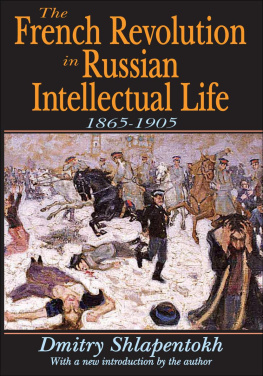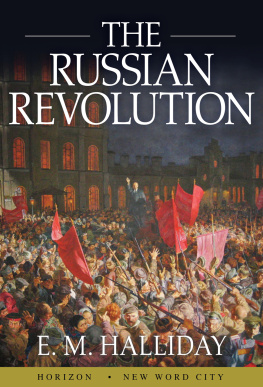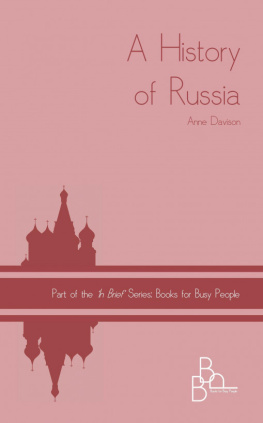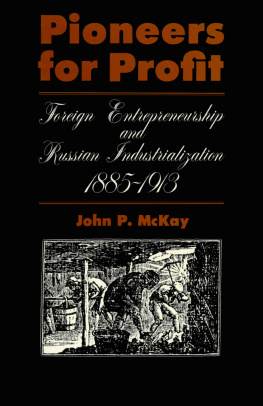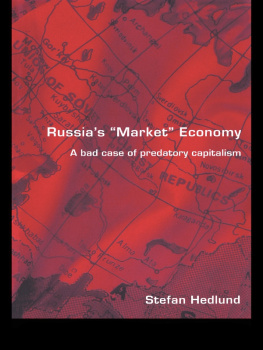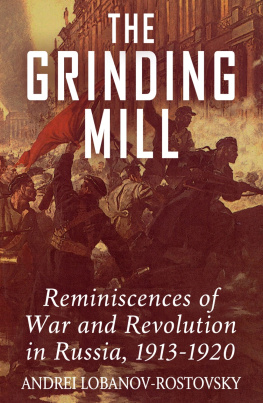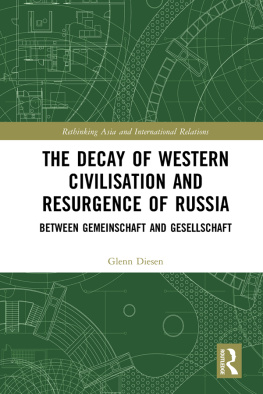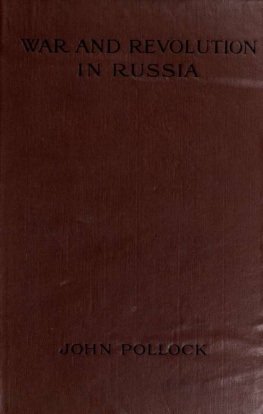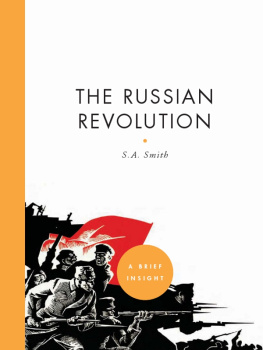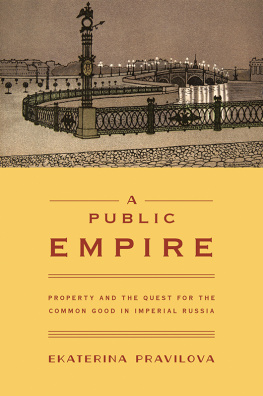2010 by Northern Illinois University Press
Published by the Northern Illinois University Press, DeKalb, Illinois 60115
Manufactured in the United States using postconsumer-recycled, acid-free paper.
All Rights Reserved
Design by Julia Fauci
Illustration Credits
Figures 1 through 5 are courtesy of the Slavic and Baltic Division, The New York
Public Library, Astor, Lenox and Tilden Foundations.
Figures 6 through 9 are courtesy of the Hoover Institution Archives.
Library of Congress Cataloging-in-Publication Data
Dowler, Wayne, 1945
Russia in 1913 / Wayne Dowler.
p. cm.
Includes bibliographical references and index.
ISBN 978-0-87580-427-9 (clothbound : alk. paper)
1. RussiaHistory19041914. 2. RussiaPolitics and government19041914.
3. RussiaSocial conditions18011914. 4. Civil societyRussiaHistory
20th century. 5. RussiaEconomic conditions18611914. I. Title.
DK263.D69 2010
947.083dc22
2010014126
Preface
Most historians would agree that the principal concern of their discipline is the study of change over time. The question arises, change toward what? The obvious answer is change toward what happened next. The answer is obvious but misleading. Unlike the historian, history has no notion about where it is going and is indifferent to outcomes. History piles detail upon detail, circumstance upon circumstance, relationship upon relationship, complexity upon complexity. The main goal of this work is to record what history had piled up in the Russian empire by the end of 1913. By that time the Russian polity had reached levels of cultural, economic, political, and social maturity and sophistication that historians are just beginning to appreciate. The preoccupation, until recently, in the historiography with broadly Marxist concerns as well as generalizations about an indeterminate period labeled late Imperial Russia has concealed the degree of complexity that life in Russia had attained just before World War I.
Any time and place is full of possibility. A secondary objective of this book is to uncover the possibilities for development that existed in Russia in 1913 as well as the obstacles to their realization. A detailed study of a society in a single year not only reveals its complexity, but also the potential that complexity contained. The Russian empire was by no means stable in 1913; its future was uncertain in the minds of its leaders and citizens. The challenges posed by the need to modernize for survival and the balance between forces for continuity and change were, nevertheless, conducive to compromise and incremental development. The domestic and international environments of 1913 still favored the evolutionary processes that since the revolution of 1905 were slowly altering the cultural, economic, political, and social landscape. The coming of the war in July 1914 and the economic and psychological toll that it increasingly exacted on the population dramatically altered the environment and began to promote forces very different from those favored in 1913 and the first half of 1914. Socialist revolution was, of course, a possibility inherent in the Russia of 1913. It was not, however, very probable. Other, more likely, possibilities were also present. Only with the significant environmental change that the war inflicted on the empire did their fortunes fade.
This portrait of Russia in 1913 is built, in some measure, on work in primary, especially printed, sources. In addition to consulting writings, speeches, memoirs, literary works, and other materials from and about 1913, I decided to read two daily newspapers from beginning to end rather than to read selectively from a number of papers. Instead of searching out in the press what preoccupied me about 1913, I opted to open my mind to the changing preoccupations of Russians as the days slipped by. My goal was to immerse myself in the density and intensity of life in the empire and to experience, however vicariously, the rhythms and dislocations of the daily news as Russians experienced them. I chose Russkie vedomosti and Moskovskie vedomosti . Both newspapers were published in Moscow and so were partly shielded from the preoccupation with the concerns of the capital characteristic of the St. Petersburg press. The former was a progressive newspaper with loose ties to the liberal Constitutional Democratic Party (Kadets). It had a readership in the upper mid-range of major Russian dailies and drew on a broad network of correspondents in the capital and the provinces for its stories. It maintained high standards of reporting. The latter was a highly conservative, but thoughtful, newspaper with a more modest number of subscribers than Russkie vedomosti . It was edited in 1913 by Lev Tikhomirov, a former revolutionary populist turned ultraconservative. His was an eloquent and intelligent voice for the conservative cause, and his newspaper set an instructive counterpoint to the liberal Russkie vedomosti .
Above all, however, this is a work of synthesis. It draws on the writings by many scores of scholars from several countries about the last years of the Russian empire. Whatever originality this book can claim lies in its attempt to create a relatively comprehensive picture of life in the empire in 1913 by bringing together research across the divides of cultural, economic, political, and social history and by searching for the common threads among them. The literature is extensive and my indebtedness is large. While attempting not to overburden the text with references, I have tried to represent the arguments of scholars fairly and to acknowledge my debts as fully as possible. I have, however, at times used evidence adduced by some researchers to support conclusions rather different from their own. Inevitably, I will have missed important studies that would have cast further light on 1913. Regrettable as that may be, at some point the research must stop and the work must take its final form.
I am deeply grateful to the staffs of the Bakhmeteff Archive at Columbia University, the Hoover Institution library and archives at Stanford University, and the Slavic Division of the New York Public Library, who pointed me to a daunting quantity of valuable material. My special thanks go to my close colleagues Professors William Dick and Robert Johnson of the University of Toronto and Professors Ronald Suny of the universities of Michigan and Chicago and Rex Wade of George Mason University. All four commented in detail on an earlier draft of this book. Thanks to their suggestions the work in its present form is greatly improved. The suggestions of two anonymous readers also helped to shape the final version. Any remaining defects are of my own doing. I thank as well the editorial and production staff of Northern Illinois University Press for their professionalism and good cheer.
For nonspecialists in the Russian field, I have provided a glossary of Russian words and terms. Except for names well known to readers of English in established transliterations, I have used the Library of Congress transliteration system. All dates are given according to the Julian calendar, which in 1913 was thirteen days behind the Gregorian calendar used in the West.
Introduction
On a chilly night in late January 1913, Professor N.S. Kogan of St. Petersburg University spoke at the Polytechnical Museum in Moscow. His subject was From Death to Life in Contemporary Literature. Learned public lectures were popular, and a large audience attended. Early in his talk, the professor referred to restrictions on freedom of speech and assembly in contemporary Russia. On cue, the police monitor, who was a fixture at most public events, intervened and ordered the speaker to stick to his pre-approved text. Kogan resumed his lecture. When he raised the name of Friedrich Nietzsche, the monitor again interrupted him. The professor explained that he spoke about Nietzsche only to oppose his views. Unconvinced, the policeman declared the lecture closed. A brief negotiation did not change his mind, and he ordered the audience to disperse. When spectators angrily demanded to know on what grounds, an anonymous voice replied, On the grounds that we are living in Russia in 1913. Police reinforcements arrived and sent the listeners home.


